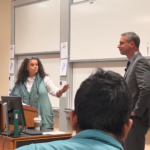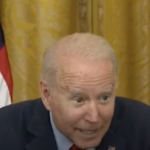Dr. Paul Kengor discusses his book “Dupes: How the Communist Left Has Manipulated the Progressive Left for a Century”

On Monday June 29, The Institute of World Politics welcomed Dr. Paul G. Kengor to discuss the topic of his recent book, Dupes: How the Communist Left Has Manipulated the Progressive Left for a Century. He presented aspects of his extensive research on the role of the “dupe” in modern American history, exploring how many progressives have been manipulated to aid the communist agenda.
While “dupe” may initially sound like a derogatory or rude terminology, its usage actually has historical and biblical precedent, noted Dr. Kengor. It was utilized throughout the Cold War by the Soviets as they developed a propaganda strategy to sell communism to the Western world. A dupe is an innocent individual with no malicious intent who is manipulated to aid and abet the opponent unwittingly. Because the progressive left ideology was most similar to that of communism, they were found to be an easy target for deception. In the 1930s, the United States Communist Party amounted to less than 100,000 people. In need of larger numbers to gain any sort of political leverage, communists resorted to duping progressives in an attempt to take down the West through cultural disruption.
Dr. Kengor’s first example of such a case was John Dewey, otherwise known as the father of United States education and renowned as an influential progressive icon. Coincidentally, the Bolsheviks were also great fans of Dewey’s work, and used his teachings as a blueprint for the Soviet educational system. Beginning in 1918, at the height of the Russian Revolution, Dewey’s books began to be published in Russian. The admiration between Dewey and the Russians was mutual, and in the 1920s he made a pilgrimage to experience the Bolshevik culture himself. He was reportedly “impressed by the orderly and safe characteristic of life in Moscow”, saying that life goes on with “regularity, safety, and decorum” following the “great success” that was the Bolshevik Revolution, just as the Soviets had hoped.
Margaret Sanger, the founder of Planned Parenthood, was similarly taken by the display of the Potemkin villages created by the Soviets. Sanger was actually a proponent of birth control for the purpose of racial eugenics, and met with the KKK on several occasions concerning the potential for “racial improvement” via birth control. In the 1920s, the Soviets legalized both abortion and divorce and the rates of both skyrocketed. The number of abortions was appalling, said Dr. Kengor, but the Soviets claimed that as soon as their economic and social plans were realized, birth control and contraception would be unnecessary. Sanger fell for this logic, believing that a functioning communist society would ensure the happiness of every child, effectively acting as a dupe for communist ideals.
Dr. Kengor next addressed Frank Marshall Davis, a mentor to Barack Obama in the 1970s. According to Kengor, Davis joined the Communist party in Chicago following the Hitler-Stalin pact and testified concerning their activity in Congress in the 1950s, providing advice and influence tainted by the Communist party agenda. Kengor also cited the American Peace Mobilization in Chicago in 1940 as an organization which similarly has a progressive left façade but is run by communist undercurrents.
In the question and answer period Dr. Kengor responded to concerns about numerous and at times controversial topics. Among these were the application of his ideas to issues recently highlighted by the media, including the racially motivated shootings in Charleston, the erosion of the traditional marriage structure by the recent Supreme Court decision, the manipulation of mainstream media for various political agendas, and the goal of effectively demonstrating Christian charity.
Dr. Kengor is a professor of political science and the Executive Director of The Center for Vision & Values at Grove City College in Pennsylvania. He is a New York Times bestselling author of multiple books, his articles have appeared in various publications, and he has frequently contributed to MSNBC, C-SPAN, NPR, the BBC, PCN-TV, EWTN, and FoxNewsChannel.
He is a visiting fellow at the Hoover Institution on War, Revolution and Peace at Stanford University, and holds a doctorate from the University of Pittsburgh’s Graduate School of Public and International Affairs and his Master’s degree from American University’s School of International Service. He is well-known as an authority on several subjects including Ronald Reagan, the Cold War, and Communism.
This post originally appeared on the website for the Institute for World Politics.




